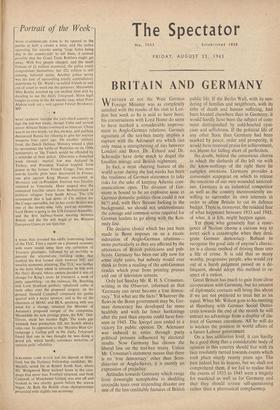BRITAIN AND GERMANY
WHETHER or not the. West German Foreign Minister was as completely satisfied with the results of his visit to Lon- don last week as he is said to have been, his conversations with Lord Home do seem to have marked a considerable improve- ment in Anglo-German relations. German signature of the test-ban treaty implies a rupture with the Adenauer era which can only mean a strengthening of ties between London and Bonn. ,Dr. Erhard and Dr. Schroeder have done much to dispel the Gaullist mirage and. British nightmare.
In fact, a most cheering feature of the world scene during the last weeks has been the readiness of, German statesmen to take risks for the sake of keeping Atlantic com- munications open. The division of Ger- many is bound to be an explosive issue in German domestic politics (how could it not be?) and, with Herr Strauss lurking ,in the background, we should not underestimate, the courage and common sense required for German leaders to go along with the Ken- nedy line.
The decisive choice which has just been made in Bonn imposes on us a recon- sideration of Anglo-German relations— more particularly as they are affected by the utterances of British politicians and pub- licists. Germany has been our ally now for some eight years, but nobody would ever think so from a reading of the anti-German tirades which pour from printing presses and out of television screens.
Only last Sunday Mr. R. H. S. Crossman, writing in the Observer, informed us that 'Germany can never become a true democ- racy.' Yet what are the facts? Whatever the flaws in the Bonn government may be, Ger- man democracy has developed far more healthily and with far fewer hankerings after the past than anyone could have fore- seen in 1945. The Spiegel case ended in a victory for public opinion. Dr. Adenauer was induced to retire through party political pressure influenced by electoral results. Now Germany has chosen the liberal line on the test-ban treaty. Unless Mr. Crossman's statement means that there is no 'true democracy' other than Scan- dinavian or Anglo-Saxon, it is merely an expression of prejudice.
Attitudes towards Germany which range from downright xenophobia to shedding crocodile tears over impending disaster are one of the less creditable features of British public life. If the Berlin Wall, with its sun- dering of families and neighbours, with its tithe of death and human suffering, had been located elsewhere than in Germany, it would hardly have been the subject of com- ment distinguished by cold-hearted cyni- cism and selfishness. if the political life of any other State than Germany had been marked by peace, order and prosperity, it would have received praise for achievement, not blame for falling short of. perfection.
No doubt, behind the censorious chorus in which the diehards of the left vie with the know-nothings of the right there lie complex emotions. Germany provides a convenient scapegoat on which to release the emotions of our own wounded national- ism. Germany is an industrial competitor as well as the country inconveniently un- willing to surrender its own interests in order to allow Britain to cut its defence budget. There is, moreover, the residual fear of what happened between 1933 and 1945, of what, it is felt, might happen again.
Yet those who genuinely fear a resur- gence of Nazism choose a curious way to avert such a catastrophe when they deni- grate German democracy. Refusal to recognise the good side of anyone's charac- ter is a classic method of driving them into a life of crime. It is odd that so many worthy, progressive people, who would cry out at a harsh judgment passed on a de- linquent, should adopt this method in re- spect of a nation.
Great Britain has much to gain from close co-operation with Germany, but no amount of diplomatic contacts will bring this about if we are not prepared to treat her as an equal. When Mr. Wilson goes to his meeting at Hamburg with German Social Demo- crats towards the end of the month he will extract no advantage from a display of dis- trust of German intentions. All he will do is weaken the position in world affairs of a future Labour government.
On a less utilitarian level, it can hardly be a good thing that a considerable body of opinion in this country should live with its face resolutely turned towards events which took place nearly twenty years ago. The past indeed has its lessons, but we shall not comprehend them, if we fail to realise that the events of 1933 to 1945 were a tragedy for mankind as well as for Germany and that they should arouse self-questioning rather than a pharasaical complacency.






























 Previous page
Previous page